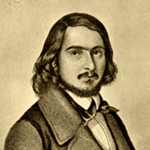To the Surrounding Deceased
The armor, your armor,
turn to your music, our music. Turn
to your armor—diced quadratus—
thousands if not smashed, flattened—
used in the reductions
of police piles, despite
your body as heraldic bearing,
here’s a brunoise, small coins squeezed
from our throats like egg yolks,
char themselves onto the cobblestone.
Dear armor, you’re unscrupulous,
reprobate. We’re gathering scarves
to choke each leatherneck—off rope,
de-sequencing the veil, burning its tassels
to broach the knuckles of succulence.
Our flame is playing the air
as if it were a violin, dear armor,
dear armor, your caboulot rooms
sink into the cataracts of the horizon,
out where forests act as bankrupt estates,
dear armor, you are within
our wrists, in hocks and jowls,
dear armor, all these smith-smoked hammers,
rebuke-eyed, manually steered conveyors
that forget all these ruffle-fats
watching you from inside our gut castles.
Dear armor, we hear you and see the opus
in your daguerreotype instance, the opera
in all your motionless tongue. You’re our music.
We’re still and foaming at the mouth
without your crépine. Make us more music.
Dear armor, it’s horrendous you’re unable
to notice yourself. The asterisk of the waterfall
is the thunder. Dear armor, divine unattainable
loins on loins, scorned bodies as shards
of hail, dear armor, the asterisks of your lances,
pikes, mêlée ensuing your loneliness,
a grain of sand on a wave of salt,
accumulating back into your home
like a melted seed turned soap.
Dear armor, our desire for your preparation
leaves us alone with complete plates
licking all the butter, all the Speyer
as if our armor depended upon its evaporation.
Duffel Bag
My drunk singing loosens me
from the fibers of reality, sleuthing
the caverns of ossuaries
for inspiration, the kind of conniving
one gets from biased acceptance.
I am not a flea on a hawk’s wing.
I am not a wing on a sky’s ear.
I am singing, trusting my phlegm
converts to coins, a mere diversion
to this stranded division
you call being elected. My drunk
song tightens loins, whistling
where the bight meets its former self.
All I have is in the composition
of this Collins. I’ve loved
trollops on mountains
and made a chorus with their
foregone imploring. As I was
summoned, I sang all I have. My song
loudens with my wallet. My drunk
singing loosens the sun, becomes
a bloodless diamond. I collect
the spit of trees as they render
cushions in batches to these
free benders. You went down
on your slaves without asking.
I climbed the mountain to drop
fools gold bricks on your arched
spine. My drunk singing
untangles what was never there.
You pierced your slaves
without asking, melting rose petals
in a batch of light so buoyant
you falsified your floating
in gratified parties that bulged
like your gut as its own statue.
My drunk singing loosens
the streets into palaces
and they become trails of the crumbs
of palaces now as choruses.
Body of Civilians: Glowing in the Alps
Highlands and massifs so stacked—
flames, candles, pyres collected—
we make up our own sun, volcanic
undoing smoothed, glowing into
the dayless. We zero in on the everything
of starving lions. We invert the hero,
choke the king in smoking mud-pit.
This haze in front of my eyes, frozen,
shouting: Body of civilians, never skeletons!
Look down on the wheat fields.
Somersault between the snow drops.
These fields, ours, no one’s, anyone’s.
The air at the gorge, that ballet
a stabbed canyon of dimensions—
That, now, in the Swiss Quarter
You monarch, we monarchs,
body of people, never extinct!
Our assemblage decentralized,
unwavering on the varying velocities
of meandering destinies. We measure
the mountains, incapacitate
providence—body
of civilians, flourishing!
Emulating messiahs we show
our teeth, wrap your prison wire
around our foreheads,
climb your crowns, mocking
power in our playgrounds
tip toeing across
your chalet lakes burning
your doors with your own wreaths!
Enjoy your stiff Swiss dance
as you avoid bending.
Body of civilians, here unending!
Your tables filled with rinds,
chandeliers ready weaponry,
broken glass reassembled
for your church portals. Body
of citizens—we are the bridge!
An den Verstorbenen
O Ritter, toter Ritter,
Leg deine Lanze ein!
Sie soll in tausend Splitter
Von mir zertrümmert sein.
Heran auf deinem Rappen,
Du bist ein arger Schalk,
Trotz Knappen und trotz Wappen,
Trotz Falk und Katafalk!
Ich steh nicht bei dem Trosse,
Der räuchernd vor dir schweigt,
Weil du ein Herz für Rosse
Und fürs Kamel gezeigt;
Baschkire oder Mandschu –
Was schiert mich deine Welt?
Ich schleudre meinen Handschuh
Dir in dein ödes Zelt.
Dem Reich der Mamelucken
Weissagst du Auferstehn
Und sähest ohne Zucken
Dein Vaterland vergehn;
Doch wiegtest unter Palmen
Du dein Prophetenhaupt,
Wenn nicht aus unsern Halmen
Du erst dein Gold geraubt?
Du steuerst nun so lange
Im Weltmeer aus und ein,
Und ward es nie dir bange,
Daß du so klein, so klein?
Ist er dir nie erschienen,
Der Fürst von Ithaka,
Wenn deine Sündermienen
In seinem Reich er sah?
Und sprach er nie mit Grollen:
Fort aus dem freien Meer!
Wirf nicht in seinen Schollen
Dein Lügenkorn umher!
Zieh heim an deine Pleiße,
Zieh heim an deine Spree;
Nicht jede Fürstenreise
Ist eine Odyssee.«
Wohl ist er unerreichbar
Der göttliche Ulyß,
Doch du bist ihm vergleichbar
Am wenigsten gewiß.
Im Saus nicht und im Brause
Hat er die Zeit verdehnt,
Er hat sich stets nach Hause
Zu Weib und Volk gesehnt.
Für deines Volkes Rechte
Wie fochtest du so schlecht!
Du standest im Gefechte
Ja, für das Türkenrecht;
Du stirbst auch auf dem Schilde,
Ja, auf dem Wappenschild;
Klag nicht, daß deine Gilde
Fortan bei uns nichts giltl
Den Marmor bringt Karrara
Noch nicht für den hervor,
An den der Niagara
Den Donner selbst verlor,
Der nur in alle Fernen
Zu seiner Schmach gereist,
Und noch vor Gottes Sternen
Auf seine Sternchen weist.
O Ritter, schlechter Ritter,
Leg deine Lanze ein !
Sie soll in tausend Splitter
Von mir zertrümmert sein.
Laß ab, laß ab und spähe
Nicht nach der Wüste Sand!
Dich setze in der Nähe
Dich in dein Vaterland.
Leicht Gepäck
Ich bin ein freier Mann und singe
Mich wohl in keine Fürstengruft,
Und alles, was ich mir erringe,
Ist Gottes liebe Himmelsluft.
Ich habe keine stolze Feste,
Von der man Länder übersieht,
Ich wohn ein Vogel nur im Neste,
Mein ganzer Reichtum ist mein Lied.
Ich durfte nur, wie andre, wollen,
Und wär nicht leer davongeeilt,
Wenn jährlich man im Staat die Rollen
Den treuen Knechten ausgeteilt;
Allein ich hab nie zugegriffen,
So oft man mich herbei beschied, I
Ich habe fort und fort gepfiffen,
Mein ganzer Reichtum ist mein Lied.
Der Lord zapft Gold aus seiner Tonne
Und ich aus meiner höchstens Wein;
Mein einzig Gold die Morgensonne,
Mein Silber all der Mondenschein1
Färbt sich mein Leben herbstlich gelber,
Kein Erbe, der zum Tod mir riet;
Denn meine Münzen prägt ich selber;
Mein ganzer Reichtum ist mein Lied.
Gern sing ich abends zu dem Reigen,
Vor Thronen spiel ich niemals auf;
Ich lernte Berge wohl ersteigen,
Paläste komm ich nicht hinauf;
Indes aus Moder, Sturz und Wettern
Sein golden Los sich mancher zieht,
Spiel ich mit leichten Rosenblättern;
Mein ganzer Reichtum ist mein Lied.
Nach dir, nach dir steht mein Verlangen,
O schönes Kind, o wärst du mein !
Doch du willst Bänder, du willst Spangen,
Und ich soll dienen gehen? Nein!
Ich will die Freiheit nicht verkaufen,
Und wie ich die Paläste mied,
Laß ich getrost die Liebe laufen;
Mein ganzer Reichtum sei mein Lied.
Vive la République! Beim Alpenglühen gedichtet
Berg an Berg und Brand an Brand
Lodern hier zusammen;
Welch ein Glühen! – ha! so stand
Ilion einst in Flammen.
Ein versinkend Königshaus
Raucht vor meinem Blicke,
Und ich ruf ins Land hinaus:
Vive la république!
Heil’ge Gluten, reiner Schnee,
Golden Freiheitkissen,
Abendglanzumstrahlter See,
Schluchten, wild zerrissen –
Daß im Schweizerlandrevier
Sich kein Nacken bücke!
Kaiser ist der Bürger hier;
Vive la republique!
Eine Phalanx stehet fest,
Fest und ohne Wanken,
Und an euren Alpen messt
Euere Gedanken!
Eurer Berge Kette nur
Ward euch vom Geschicke;
Auf die Kette schrieb Natur:
Vive la république !
Blumen um die Schläfe her
Steigen eure Höhen,
Frisch, wie Venus aus dem Meer,
Auf aus euren Seen;
Daß aus deinem Jungfernkranz
Man kein Röschen knicke,
Schweizerin, hüt ihn wohl beim Tanz!
Vive la république!
Auf die Felsen wollte Gott
Seine Kirchen bauen;
Vor dem Felsen soll dem Spott
Seiner Feinde grauen!
Zwischen hier und zwischen dort
Gibt’s nur eine Brücke.
Freiheit, o du Felsenwortt
Translator’s note:
I first encountered Georg Herwegh’s name as I read through Mary Gabriel’s Love and Capital. I had long been obsessed with the details of the life of Karl Marx—his friendship with Engels, the Economic & Philosophic Manuscripts of 1844, then volumes of Capital, etc. I went on to graduate school studies in Marxism in a philosophy program but it wasn’t until MFA in Poetry school at Brooklyn College that Gabriel came out with her book which put me onto Herwegh. Sure, Heine and Freiligrath have always been the more well-known, more accomplished German poets. But it was Gabriel’s book that hinted at Herwegh being at the center of a whole slew of radical philosophers. Bakunin was his best man at his wedding. Arnold Ruge was starting a commune with Herwegh and his wife, Emma, etc. Their lives became more fascinating than their theory.
Then I went to the Brooklyn College library to see if they had any Herwegh translations but they didn’t; however, there was a copy of Gedichte Eines Lebendigen in German, on the shelves, from the 19th century, able to be taken home. I checked it out. For 3 years straight. I used it to begin translating all of Herwegh’s work. My time studying Hegel and Marx made me familiar with written German. And it did. Once I started to read through Herwegh’s letters and diary entries, he came to full life. He was quite the scoundrel and was exiled nearly as many times as Marx.
I am using minimal formal frameworks throughout the poem translations. Mainly, I adhere to his line structure and use my own sound and rhythm structure. Herwegh mostly wrote anthems (which, at the time, were incredibly radical and now read more like church hymnal excerpts). So to stray from the potential boredom of a slightly archaic anthem, I am infusing sound mechanisms that spill the explosion of sound from the inside-out. I also use the constraint of not utilizing a word that would be too modern for Herwegh’s years of writing. Basically, if it didn’t exist in or before 1865, then it won’t be in the poem conceptually. While I have translated poets from Mexico, Colombia, and Spain, it’s been the complete project with Herwegh’s work that I turn to the most when I am not writing my own poems.

Ken L. Walker lives in Kentucky, is the author of Twenty Glasses of Water (Diez, 2014) and Antworten (Greying Ghost, 2017). Additional work can be found in Boston Review, Hyperallergic, The Poetry Project Newsletter, The Brooklyn Rail, The Seattle Review, Atlas Review, Lumberyard, and Tammy.

Georg Herwegh was born in 1817 in Stuttgart, and died in 1875 in Lichtental. He was a revolutionary poet, friend to Karl Marx and Friedrich Engels, and poet in the Vormärz—a period of history beginning in the early 1800s with a literary movement of the same name centered around sociopolitical topics leading to the 1848 revolution. Herwegh is considered, along with Heinrich Heine and Ferdinand Freiligrath, one of 19th century’s the most popular German-speaking male poets, after writing Gedichte Eines Lebendigen.

 BACK TO ISSUE
BACK TO ISSUE